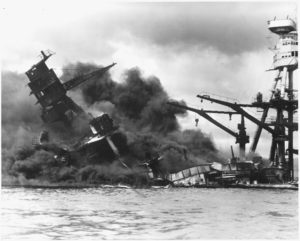
USS Arizona burning at Pearl Harbor, December 7, 1941 with 1, 774 crew members aboard who lost their lives. All twenty-one members of the Arizona’ band, known as U. S. Navy Band Unit (NBU) 22 died. (Photo from Wikimedia Commons)
Wednesday, December 7, 2016, was the 75th anniversary of the Day of Infamy, when Japanese aircraft routed the ill-prepared U. S. Naval Base at Pearl Harbor in Hawaii Territory. The surprise attack on Sunday morning began at 7:53 a.m. there and was over in little less than three hours.
More than 2,300 Americans died, including a young man from Hunt County. The USS Arizona was destroyed with men aboard; the USS Oklahoma capsized. In all, twelve ships were sank or beached and nine more damaged. Approximately 160 aircraft were destroyed and 150 damaged. The United States Navy was near complete destruction.
Within the next twenty-four hours, Japanese planes attacked Malaysia, Guam, Hong Kong, the Philippine Islands, Wake, and Midway.
President Franklin Roosevelt addressed Congress and the nation the next day at noon. Congress then declared war on Japan within an hour after the president gave his Day of Infamy speech. Within days the Axis Powers (Japan, Germany, and Italy) countered with declaration of war on the US.
As soon as the attack began, radio stations in nearby Honolulu broadcasted the news. Some of the stations had the capability to reach the US mainland. In New York, the radio broadcast of the Giants and Brooklyn Dodgers was interrupted. The American people were told, “The White House announces Japanese attack on Pearl Harbor.”
Much like the assassination President John F. Kennedy in 1963 and the attacks of 9-11 in 2001, almost every American would remember where they were and what they were doing when they heard the news about Pearl Harbor.
My mother clearly remembered December 7, 1941 for the rest of her life. She and my father married in late September that year. Both were students at what is today the University of North Texas. For some reason, they were driving to her family ranch west of Archer City when the radio station interrupted programming to announce the disaster. Everyone was in shock, even though most knew what was in store for the country.
My father was an engineering student at Denton. He and three other men were hired by Consolidated Aircraft in San Diego to work as draftsmen on current and new aircraft. I never thought to ask if he left after Christmas; I always assumed he did. But with the severity of the situation, I now wonder if he didn’t leave sooner.
Mother continued in school until she was able to join him in San Diego. Later he was transferred to Fort Worth. I knew he served in an infantry unit in Italy from Naples to the Austrian border. Shortly before he died, he told me that he was ashamed for not serving in the military, quit his job with its deferment, and joined the Army. Fortunately he made it home.
I wonder how many older citizens can still remember what they were doing that peaceful Sunday morning? To hear those early broadcasts and FDR’s Day of Infamy speech on film, go to youtube.com. Type in “FDR Declares War”. Note that Speaker of the House Sam Rayburn is sitting behind President Roosevelt.
